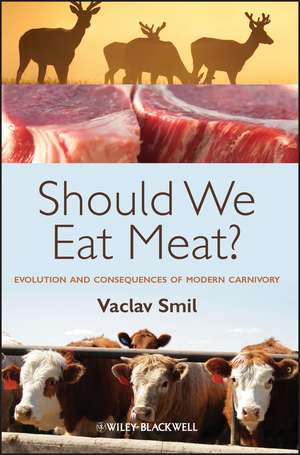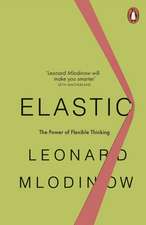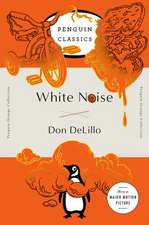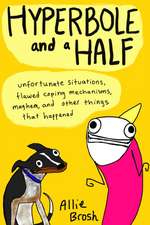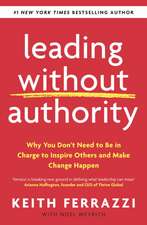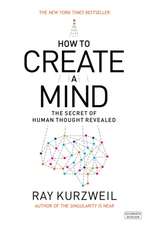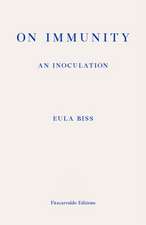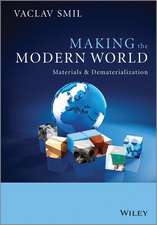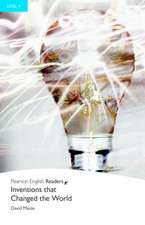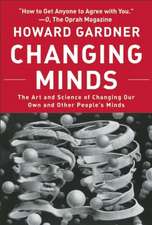Should We Eat Meat? – Evolution and Consequences of Modern Carnivory: Gates Notes - Cărți recomandate de Bill Gates
Autor V Smilen Limba Engleză Paperback – 2 mai 2013
This book is a wide–ranging and interdisciplinary examination and critique of meat consumption by humans, throughout their evolution and around the world. Setting the scene with a chapter on meat s role in human evolution and its growing influence during the development of agricultural practices, the book goes on to examine modern production systems, their efficiencies, outputs, and impacts. The major global trends of meat consumption are described in order to find out what part its consumption plays in changing modern diets in countries around the world. The heart of the book addresses the consequences of the "massive carnivory" of western diets, looking at the inefficiencies of production and at the huge impacts on land, water, and the atmosphere. Health impacts are also covered, both positive and negative. In conclusion, the author looks forward at his vision of rational meat eating , where environmental and health impacts are reduced, animals are treated more humanely, and alternative sources of protein make a higher contribution.
Should We Eat Meat?is not an ideological tract for or against carnivorousness but rather a careful evaluation of meat′s roles in human diets and the environmental and health consequences of its production and consumption. It will be of interest to a wide readership including professionals and academics in food and agricultural production, human health and nutrition, environmental science, and regulatory and policy making bodies around the world.
Din seria Gates Notes - Cărți recomandate de Bill Gates
- 17%
 Preț: 67.59 lei
Preț: 67.59 lei - 14%
 Preț: 72.63 lei
Preț: 72.63 lei - 16%
 Preț: 64.19 lei
Preț: 64.19 lei - 15%
 Preț: 81.22 lei
Preț: 81.22 lei - 22%
 Preț: 50.01 lei
Preț: 50.01 lei - 21%
 Preț: 56.33 lei
Preț: 56.33 lei - 16%
 Preț: 70.20 lei
Preț: 70.20 lei - 16%
 Preț: 58.13 lei
Preț: 58.13 lei -
 Preț: 69.34 lei
Preț: 69.34 lei - 24%
 Preț: 53.62 lei
Preț: 53.62 lei - 24%
 Preț: 82.56 lei
Preț: 82.56 lei - 25%
 Preț: 61.57 lei
Preț: 61.57 lei - 16%
 Preț: 69.60 lei
Preț: 69.60 lei - 17%
 Preț: 57.65 lei
Preț: 57.65 lei - 15%
 Preț: 70.33 lei
Preț: 70.33 lei - 20%
 Preț: 82.12 lei
Preț: 82.12 lei -
 Preț: 162.17 lei
Preț: 162.17 lei -
 Preț: 82.31 lei
Preț: 82.31 lei -
 Preț: 94.62 lei
Preț: 94.62 lei - 17%
 Preț: 109.13 lei
Preț: 109.13 lei -
 Preț: 121.70 lei
Preț: 121.70 lei -
 Preț: 150.35 lei
Preț: 150.35 lei - 5%
 Preț: 107.54 lei
Preț: 107.54 lei - 23%
 Preț: 84.51 lei
Preț: 84.51 lei -
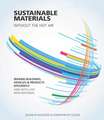 Preț: 381.74 lei
Preț: 381.74 lei - 14%
 Preț: 56.04 lei
Preț: 56.04 lei - 16%
 Preț: 69.04 lei
Preț: 69.04 lei - 16%
 Preț: 58.59 lei
Preț: 58.59 lei -
 Preț: 89.22 lei
Preț: 89.22 lei - 14%
 Preț: 72.35 lei
Preț: 72.35 lei -
 Preț: 108.58 lei
Preț: 108.58 lei - 18%
 Preț: 69.53 lei
Preț: 69.53 lei -
 Preț: 92.12 lei
Preț: 92.12 lei - 16%
 Preț: 58.18 lei
Preț: 58.18 lei - 15%
 Preț: 60.10 lei
Preț: 60.10 lei - 17%
 Preț: 57.52 lei
Preț: 57.52 lei -
 Preț: 150.31 lei
Preț: 150.31 lei -
 Preț: 82.44 lei
Preț: 82.44 lei - 18%
 Preț: 55.89 lei
Preț: 55.89 lei - 24%
 Preț: 62.36 lei
Preț: 62.36 lei - 22%
 Preț: 64.94 lei
Preț: 64.94 lei - 23%
 Preț: 63.84 lei
Preț: 63.84 lei - 14%
 Preț: 72.53 lei
Preț: 72.53 lei - 24%
 Preț: 62.77 lei
Preț: 62.77 lei -
 Preț: 73.70 lei
Preț: 73.70 lei - 16%
 Preț: 69.54 lei
Preț: 69.54 lei -
 Preț: 106.56 lei
Preț: 106.56 lei -
 Preț: 94.47 lei
Preț: 94.47 lei -
 Preț: 316.48 lei
Preț: 316.48 lei
Preț: 254.04 lei
Nou
48.61€ • 51.02$ • 40.35£
Carte disponibilă
Livrare economică 20 martie-03 aprilie
Livrare express 05-11 martie pentru 30.89 lei
Specificații
ISBN-10: 1118278720
Pagini: 276
Dimensiuni: 159 x 228 x 16 mm
Greutate: 0.48 kg
Ediția:New.
Editura: Wiley
Seria Gates Notes - Cărți recomandate de Bill Gates
Locul publicării:Chichester, United Kingdom
Public țintă
Academic institutions: food science, nutrition, agriculture, environmental science, Food manufacturers and livestock producers, Governmental research and regulatory agencies throughout the world, Advanced undergraduate and graduate students in the fieldDescriere
Meat eating is often a contentious subject, whether considering the technical, ethical, environmental, political, or health–related aspects of production and consumption.
This book is a wide–ranging and interdisciplinary examination and critique of meat consumption by humans, throughout their evolution and around the world. Setting the scene with a chapter on meat s role in human evolution and its growing influence during the development of agricultural practices, the book goes on to examine modern production systems, their efficiencies, outputs, and impacts. The major global trends of meat consumption are described in order to find out what part its consumption plays in changing modern diets in countries around the world. The heart of the book addresses the consequences of the "massive carnivory" of western diets, looking at the inefficiencies of production and at the huge impacts on land, water, and the atmosphere. Health impacts are also covered, both positive and negative. In conclusion, the author looks forward at his vision of rational meat eating , where environmental and health impacts are reduced, animals are treated more humanely, and alternative sources of protein make a higher contribution.
Should We Eat Meat? is not an ideological tract for or against carnivorousness but rather a careful evaluation of meat′s roles in human diets and the environmental and health consequences of its production and consumption. It will be of interest to a wide readership including professionals and academics in food and agricultural production, human health and nutrition, environmental science, and regulatory and policy making bodies around the world.
Textul de pe ultima copertă
Meat eating is often a contentious subject, whether considering the technical, ethical, environmental, political, or health–related aspects of production and consumption.
This book is a wide–ranging and interdisciplinary examination and critique of meat consumption by humans, throughout their evolution and around the world. Setting the scene with a chapter on meat s role in human evolution and its growing influence during the development of agricultural practices, the book goes on to examine modern production systems, their efficiencies, outputs, and impacts. The major global trends of meat consumption are described in order to find out what part its consumption plays in changing modern diets in countries around the world. The heart of the book addresses the consequences of the "massive carnivory" of western diets, looking at the inefficiencies of production and at the huge impacts on land, water, and the atmosphere. Health impacts are also covered, both positive and negative. In conclusion, the author looks forward at his vision of rational meat eating , where environmental and health impacts are reduced, animals are treated more humanely, and alternative sources of protein make a higher contribution.
Should We Eat Meat? is not an ideological tract for or against carnivorousness but rather a careful evaluation of meat′s roles in human diets and the environmental and health consequences of its production and consumption. It will be of interest to a wide readership including professionals and academics in food and agricultural production, human health and nutrition, environmental science, and regulatory and policy making bodies around the world.
Cuprins
Preface ix 1 Meat in Nutrition 3
Meat Eating and Health: Benefits and Concerns 4
Meat and its nutrients 6
Meat as a source of food energy 11
High–quality protein and human growth 17
Carnivory and civilizational diseases 20
Diseased meat 24
2 Meat in Human Evolution 31
Hunting Wild Animals: Meat in Human Evolution 33
Primates and hominins 35
Meat consumption during the Paleolithic period 39
Extinction of the late Pleistocene megafauna 42
Hunting in different ecosystems 45
Wild meat in sedentary societies 49
Traditional Societies: Animals, Diets and Limits 51
Domestication of animals 53
Population densities and environmental imperatives 56
Long stagnation of typical meat intakes 59
Avoidances, taboos and proscriptions 63
Meat as a prestige food 66
3 Meat in Modern Societies 71
Dietary Transitions: Modernization of Tastes 72
Urbanization and industrialization 74
Long–distance meat trade 77
Meat in the Western dietary transition 81
Transitions in modernizing economies 84
Globalization of tastes 86
Output and Consumption: Modern Meat Chain 89
Changing life cycles 91
Slaughtering of animals 94
Processing meat 98
Consuming and wasting meat 102
Making sense of meat statistics 107
4 What It Takes to Produce Meat 113
Modern Meat Production: Practices and Trends 117
Meat from pastures and mixed farming 118
Confined animal feeding 122
Animal feedstuffs 127
Productivity efficiencies and changes 135
Treatment of animals 141
Meat: An Environmentally Expensive Food 145
Animal densities and aggregate zoomass 147
Changing animal landscapes 150
Intensive production of feedstuffs 155
Water use and water pollution 160
Meat and the atmosphere 168
5 Possible Futures 177
Toward Rational Meat Eating: Alternatives and Adjustments 181
Meatless diets 183
Meat substitutes and cultured meat 188
Protein from other animal foodstuffs 192
Less meaty diets 200
A large potential for rational meat production 203
Prospects for Change 210
References 217
Index 251
Recenzii
Notă biografică
Dr Vaclav Smil is Distinguished Professor Emeritus in the Faculty of Environment at the University of Manitoba. His interdisciplinary research interests encompass a broad area of energy, environmental, food, population, economic, historical, and public policy studies. Dr Smil has published in more than 30 books, over 400 papers, and contributed to more than 30 edited volumes
